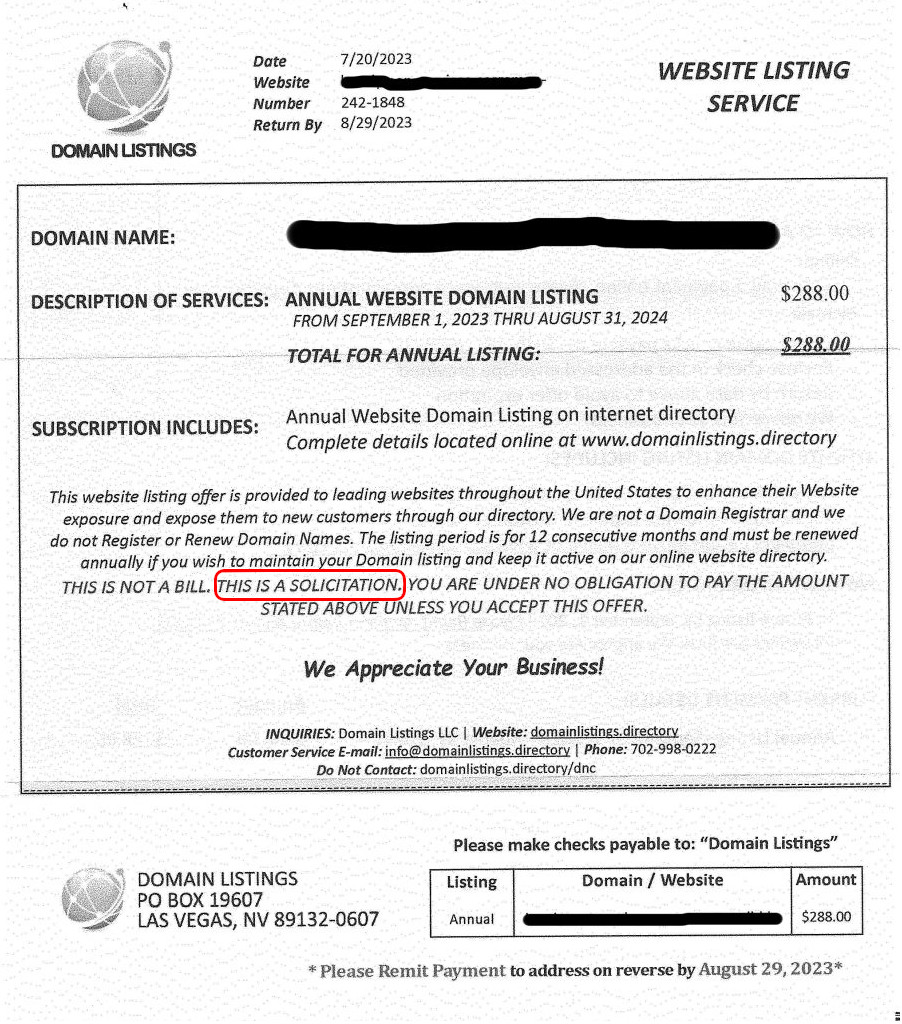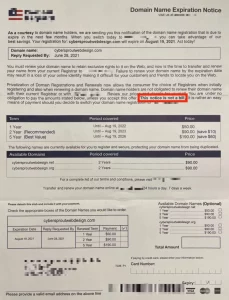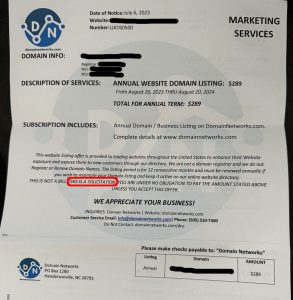In this edition of our ScamWatch series, we’re highlighting a specific type of scam that’s has been around for years, but just won’t go away—fake domain registration renewal letters sent by good old-fashioned snail mail.
What Are Fake Domain Registration Renewal Letters?
Picture this: You’re sorting through your mail, and you find a letter that looks official. It says your domain is about to expire, urging you to renew immediately. The letter looks professional and uses scary language like “final notice” or “urgent action required.” But here’s the catch—it’s a scam.
(Click an image to expand it)
The critical thing to remember is this: if it arrives by mail, it’s almost certainly a scam. Unlike emails, which can sometimes be legit (though they require careful scrutiny), you can safely assume that 100% of domain-related letters sent via snail mail are fraudulent. Just throw them out.
Why Do Scammers Send These Letters?
While many scams these days target your inbox, domain renewal scams have a retro twist—they often arrive by postal mail. Scammers choose this method because it feels more official and less likely to be questioned. After all, most people are cautious about clicking on email links but may be less skeptical of a physical letter that looks official.
These fraudsters use public domain registration data, pulling your contact information from databases like WHOIS (whois.com). Then they mail you a letter, hoping the official-looking document convinces you to part with your money.
How to Spot and Avoid Fake Domain Letters
It’s easy to avoid falling victim to these scams once you know what to look for. Here’s a quick checklist to help you stay safe:
- They’re always demanding way too much money. Domain registration should cost you between about $10 and about $20 per year. These scams are typically looking for several hundred dollars.
- If it’s by mail, it’s a scam: As we mentioned, no legitimate domain registrar sends renewal notices via postal mail. All genuine renewal notifications come through email or your registrar’s online portal.
- Verify through your registrar’s website: If you’re ever in doubt about the status of your domain, log into your account with your official registrar directly. Don’t trust any information that comes from a letter in the mail. Popular registrars include Porkbun, Godaddy, Ionos, Namecheap, Bluehost, and DreamHost. (We have no affiliation with any of these, they’re just popular providers. If you need a recommendation, please reach out to us and we’ll give you our thoughts on them.)
- Keep track of your domain expiration date: One of the best ways to avoid these scams is to stay on top of your renewal schedule. Make a note of when your domain actually expires and set reminders to renew it through your registrar. (Pro tip: Include the name of your registrar in the reminder because MANY people forget who they registered the domain with)
- Enable domain privacy protection: Protect yourself by enabling privacy protection when you register your domain. This keeps your contact details out of public databases, making it a bit harder for scammers to target you.
Related Scams We’ve Covered
Fake domain renewal letters aren’t the only scam targeting business owners. In fact, we’ve written about domain listing scams in the past, which work in much the same way. These scams also arrive with official-sounding language, urging you to pay for a “listing service” that your domain doesn’t need. Reading through that older, but highly-related post is a smart way to keep yourself protected.
Final Thoughts: Toss That Letter!
As part of our ScamWatch series, our goal is to help small business owners like you stay ahead of scams and keep your operations running smoothly. When it comes to domain renewal letters that show up in your physical mailbox, you can be confident they’re not legit. Throw them away immediately and stick to managing your domain renewals through trusted, verified channels.
By staying alert and informed, you can avoid falling for these tricks and ensure your business stays protected. If you ever have questions or come across something suspicious, feel free to reach out or revisit our articles for guidance.





